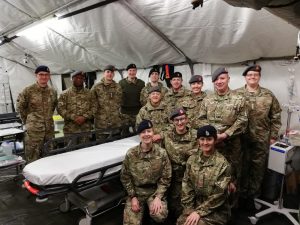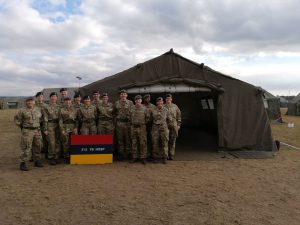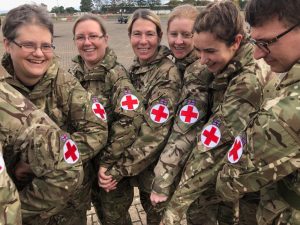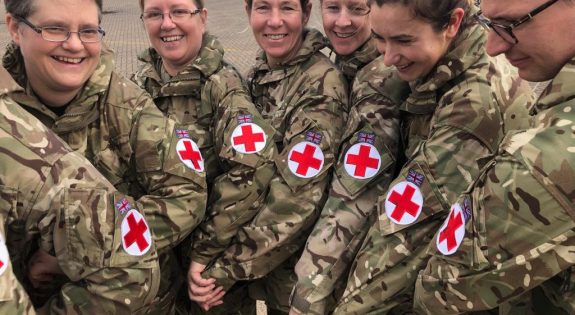News
January 13th 2021
Major Rachel Reynolds – Senior Emergency Department Nurse & Army Reservist with 212 Field Hospital
“Over the last 21 years I have gained so much from my life within the Army Reserves. Life as a Reservist goes hand-in-hand with working in the NHS.” Major Rachel Reynolds, Senior Emergency Department nurse and Army Reservist tells her story in her own words.
Most hospitals support time for the Reserves in their employment, either with paid leave or special leave, which is not paid. This varies from Trust to Trust. I believe, as Reservists, that we have the best of both worlds where we can run two parallel careers which complement one another. I have combined my work in the Emergency Department of a hospital with a career as an Army Reservist.
Currently, due to Coronavirus, most of our training is virtual in nature. It has continued without a break, at least two weekends a month and every Tuesday evening. For personnel attending courses, these have had to change to be COVID-secure but are continuing to be run and this includes recruit courses for new personnel.

212 Field Hospital (Major Rachel Reynolds far right of photo)
Joining as a Reservist
I have always been interested in joining the Army and joined the Reserves at 212 Field Hospital in March 1999. That same weekend that I qualified as a Registered Nurse Adult. In the Autumn, I completed my recruit training and in December 2000 I was awarded the Queen’s Commission.
I attended The Royal Military Academy Sandhurst to do my Entry Officers course in April 2002. This was an excellent course where I learned much about leadership at the start of my military careers. It resulted in us being the first Professionally Qualified Officers course to march off the parade square at Sandhurst.
In 2003 I was mobilised on Operation TELIC to Iraq. I worked on the ward area there. This taught me that we should be grateful for the stability we have in our lives and the things which we take for granted are non-existent for many people there.
Advanced Clinical Training
I have attended many courses over the years, such as Advanced Life Support (ALS). This is a qualification recognised by NHS Trusts. Attendance on these courses is free to serving personnel and you get a daily rate of pay to attend them. It includes many other courses in Life Support and other specialist courses such as Emergency Management of Severe Burns.
Another course that I passed was Battlefield Advanced Trauma Life Support. This was an excellent course, similar to Advanced Trauma Life Support run in the NHS, but relevant to a battlefield setting. The course culminates in assessments and scenarios which are very realistic using casualty actors (actors who are amputees) and in realistic conditions, such as in the dark and outdoors. Casualty simulation and make-up are used, including fake blood which they love soaking you in as you are treating them!
In July 2018 I took part in a mass casualty exercise called Live Ex. It was held at the Army Medical Services Training Centre. The simulation incorporated a realistic replica of the Emergency Department of the local hospitals. This enabled the NHS staff in these Trusts to put simulated training to good use and test their major incident plans.

Members of 212 Field Hospital on exercise
The Major Incident Medical Management Systems course teaches you how to control major incidents and liaise with the Emergency Services, thus giving casualties the greatest chance of survival. This was in a pre-hospital environment and I thoroughly recommend it.
On a chemical, biological, radiological and nuclear clinical course, I learned how to look after these casualties and the unique challenges they bring. It enabled me to assist with mandatory and major incident training, giving realistic scenarios to my Emergency Department colleagues.
Opportunities in education, travel and sport
The opportunities do not stop at clinical courses. Many personnel have done further academic study to gain qualifications. For example, I completed modules in a top-up degree and also gained my mentorship qualification. This is particularly useful in my current role within the military as a Trauma Nurse Co-ordinator and Emergency Department Nursing Officer. It is also recognised by the NHS.
If you have a specific interest in sports or adventure training, there are many courses that the Army pay you to do, such as instructing in skiing. Many unit members are also involved in representing the Army in horse riding, golf, athletics and basketball, to name just a few.
Every year there is an Annual Continuous Training Exercise. These vary in location but have included Germany, Gibraltar, Jersey and the USA, as well as locations in the UK. Some of these exercises include training with non-UK military. I mobilised to the Ascension Islands to provide medical cover for an exercise with the Royal Engineers. This was a unique opportunity to work with them and to observe work within the local hospital, as well as doing adventure training there.
Many members have deployed to both Iraq and Afghanistan, as well as assisting with the Ebola Crisis in Sierra Leone.

Members of 212 Field Hospital display their armbands
A warm welcome awaits
In summary, I encourage anyone who has an interest in joining the Army Reserve to get in touch. I am part of 212 Field Hospital; we are a welcoming, friendly unit with many job roles available. These are not just in healthcare roles but other areas such as transport, catering, and clerical roles too. There are also many other Army Reserve units who are recruiting should there not be a niche in 212 Field Hospital.
212 Field Hospital is based in Sheffield, with recruiting detachments in Nottingham, Lincoln, Leeds, and York. Contact details for more information: robin.dutt546@mod.gov.uk 07876 593295.
Find out more about other opportunities in the Army Reserve.
"I believe, as Reservists, that we have the best of both worlds where we can run two parallel careers which complement one another." Major Rachel Reynolds

